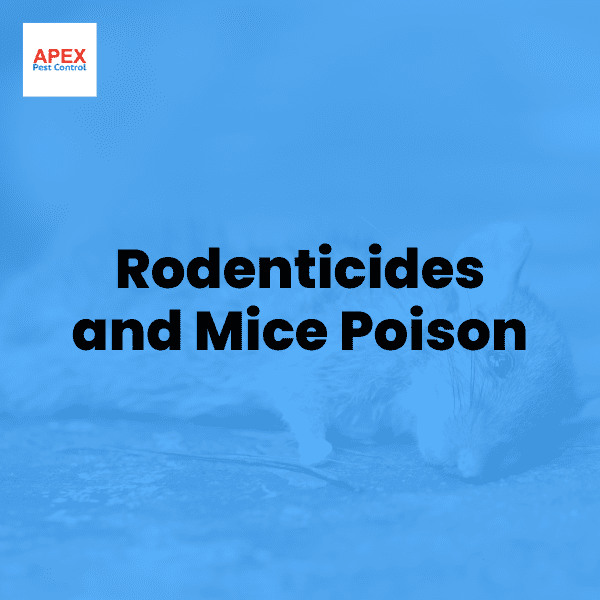Effective Rodenticides: The Key to Successful Mice Pest Control
At Apex Pest Control, we understand the importance of effective rodent management in South Yorkshire. Our expertise in rodenticides and mice poisoning helps keep homes and businesses in Sheffield, Barnsley, and Rotherham pest-free. Let’s delve into the world of rodenticides and how they can be used safely and effectively.
Explore the most effective rodent traps with our expert guide, featuring top solutions and strategies for keeping your home or business rodent-free.
What Are Rodenticides?
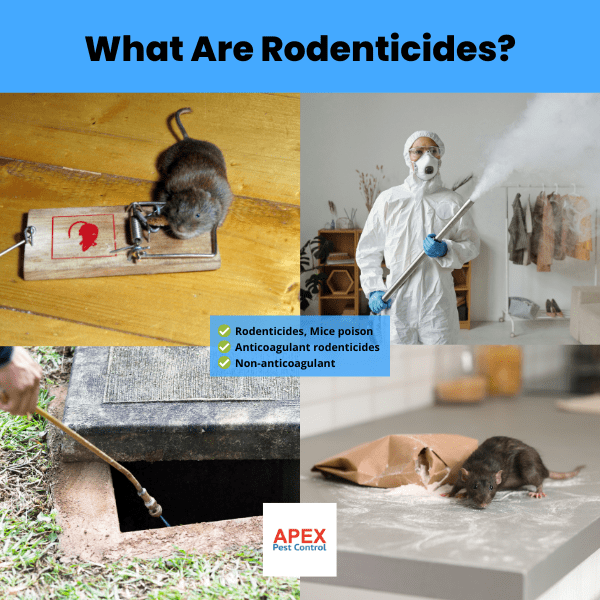
Rodenticides are specialised pesticides designed to control rodents like rats and mice. These products play a crucial role in pest management, helping to prevent property damage, crop loss, and the spread of diseases.
Types of Rodenticides
Rodenticides come in various forms, including:
- Baits
- Dusts
- Fumigants
- Tracking powders
The two main categories are:
- Anticoagulant Rodenticides (AR): These inhibit blood clotting, leading to internal bleeding.
- Non-anticoagulant Rodenticides (NAR): These work through various mechanisms, such as disrupting the nervous system or causing kidney failure.
A Brief History of Rodenticides
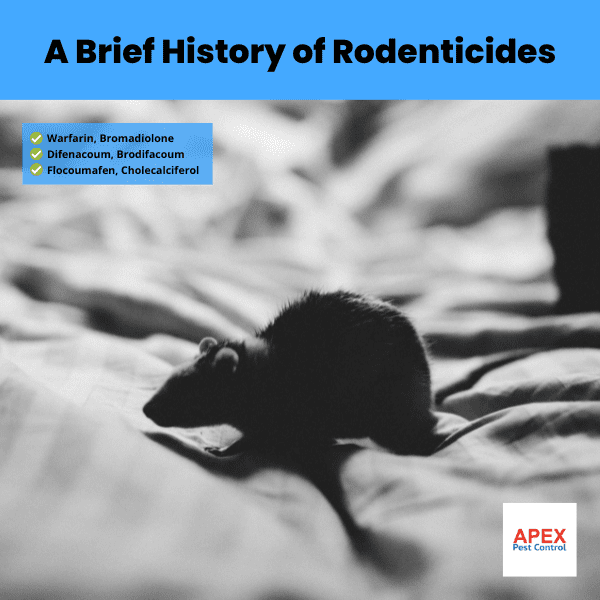
Early Use
The use of chemicals for rodent control dates back centuries. One notable early substance was red squill, derived from a Mediterranean plant species. Its toxic effects were discovered by ancient civilisations.
Evolution of Rodenticides
As science advanced, so did rodent control methods. Warfarin was introduced in 1948, becoming the first widely-used AR due to its efficacy against rats resistant to previous substances like arsenic-based compounds.
How Rodenticides Work
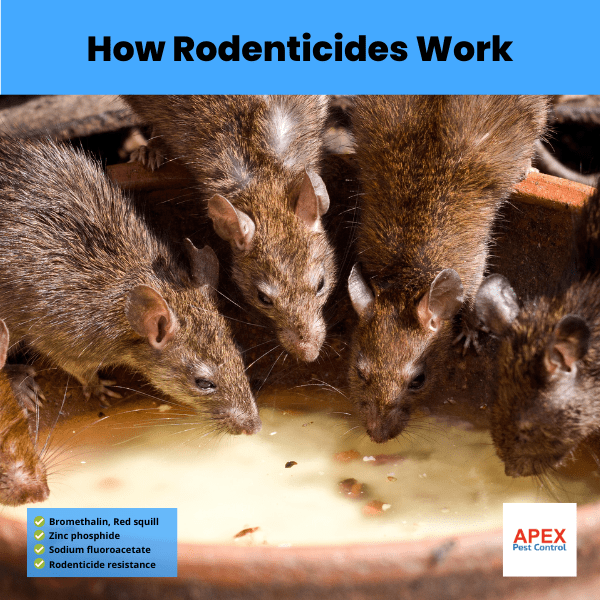
Mechanism of Action
Both ARs and NARs work systematically, meaning they need to be ingested by the targeted pest to exert their lethal effect. After ingestion, they interfere with critical physiological processes such as blood clotting or nerve function until death ensues.
Different Effects of Various Types
While all types aim for lethality, each has unique properties that can influence:
- How quickly it works
- What pests it’s effective against
- Whether secondary poisoning is possible
Uses of Rodenticides
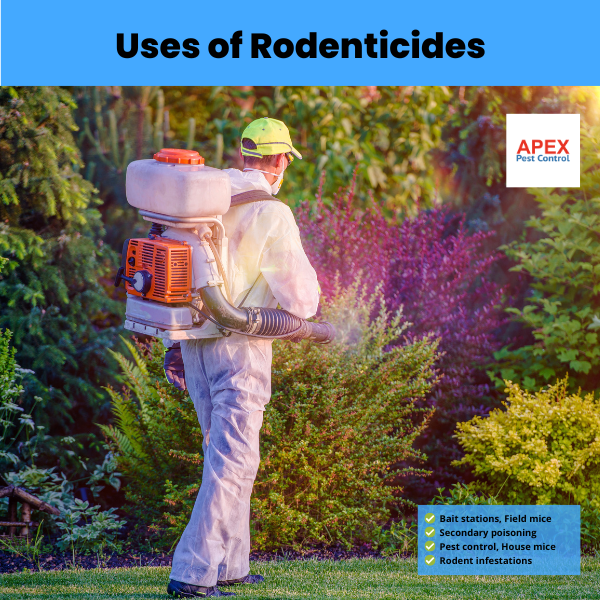
Agricultural Use
Many farmers in South Yorkshire turn to these products to protect their crops, livestock, and infrastructure from the destructive behaviour and disease transmission associated with rodents. They often deploy bait stations along field perimeters and barn areas.
Residential Use
Homeowners in Sheffield, Barnsley, and Rotherham also find rodenticides helpful in controlling infestations, especially in situations where traps and exclusion methods aren’t enough. Typically, baited devices are carefully placed out of the reach of children and pets.
Industrial Use
Warehouses, food production facilities, and other industrial settings in the UK frequently utilise rodenticides to keep populations under control and prevent contamination of equipment and materials.
Risks and Dangers of Rodenticides
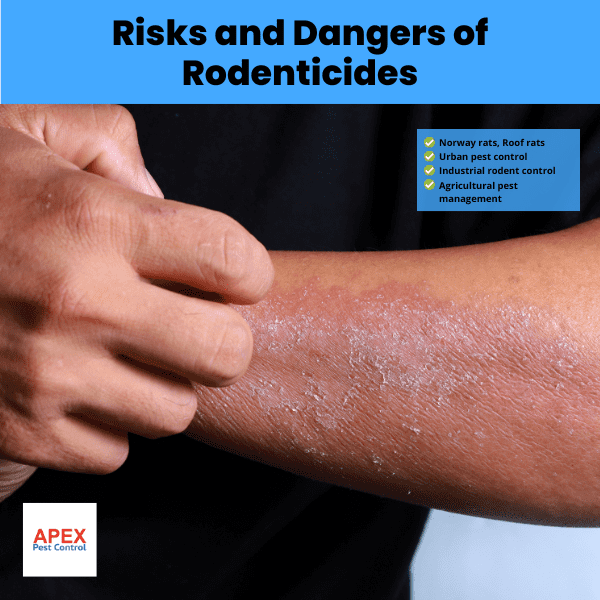
Risks to Non-Target Animals
Accidental ingestion by wildlife and pets is a major concern. This can lead to secondary poisoning in animals that prey on rodents that have consumed the poison.
Risks to Humans
While rare, humans are also at risk if they come into direct contact with these substances or consume contaminated food. Effects can range from mild skin irritation to severe internal bleeding, depending on the type and amount of exposure.
Environmental Impact
When improperly used, rodenticides may enter waterways through runoff, potentially affecting aquatic life and contaminating drinking water sources.
Safe Handling and Use of Rodenticides
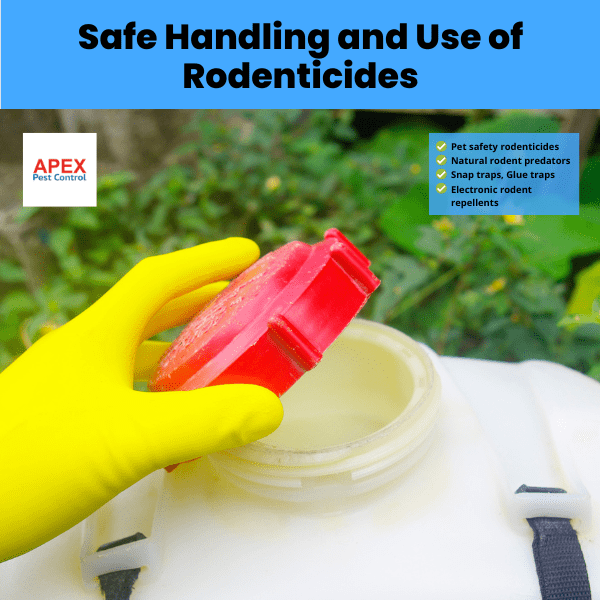
At Apex Pest Control, we prioritise safety in all our pest management practices. Here are some key guidelines:
Proper Storage
Rodenticide products should be stored in a secure location away from children and pets to avoid accidental exposure.
Safe Application Methods
Use according to label instructions is key for safety. This usually involves placing baits in specific locations while minimising non-target exposure.
Disposal of Unused Rodenticides
Unwanted or outdated products need to be disposed of properly, often involving a hazardous waste facility. They should never be discarded in regular household trash.
Alternatives to Rodenticides
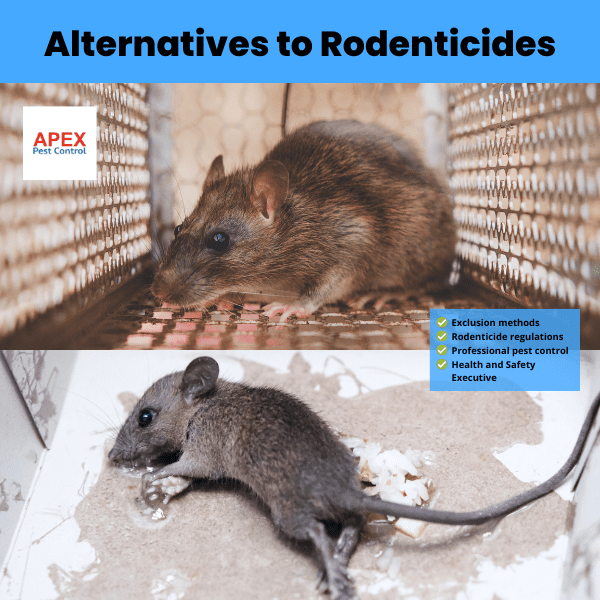
Natural Predators
Encouraging the presence of owls, hawks, and snakes as natural predators of mice and rats can be an effective method of reducing populations without the use of chemicals. However, it requires careful management to maintain a balance in the ecosystem.
Traps and Other Mechanical Methods
Snap traps, live-catch traps, and glue boards are among the popular mechanical options for homeowners and farmers alike. These methods require regular maintenance to monitor success and remove caught pests.
Biological Control Methods
The use of pathogens such as bacteria or viruses that specifically target rodents offers another alternative. While still in its early stages, research has shown promising results for certain species of these agents.
Regulations and Laws on Rodenticides
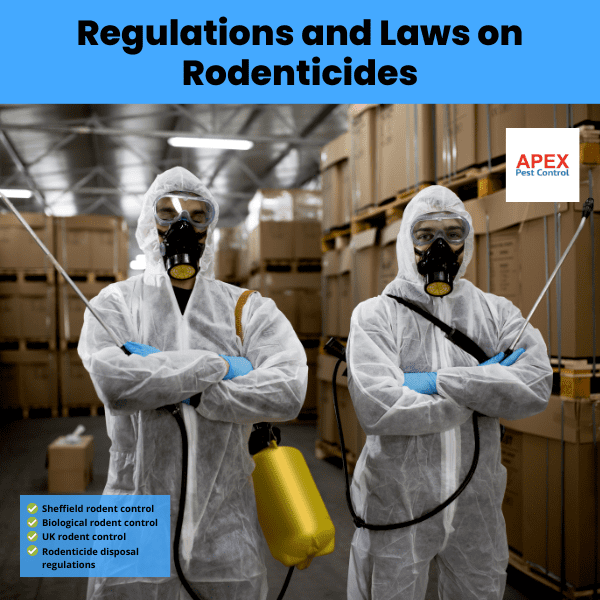
Local Regulations
Different municipalities in South Yorkshire might have their own regulations regarding use, including restrictions on certain types or requirements for professional applications.
National Regulations
On a national level, regulatory bodies like the Health and Safety Executive (HSE) oversee the approval and use of rodenticides in the UK, establishing safety standards and labelling requirements.
International Regulations
Various international agreements also exist to control the global trade of these substances as well as ensure their safe and responsible handling across borders.
Future of Rodenticides
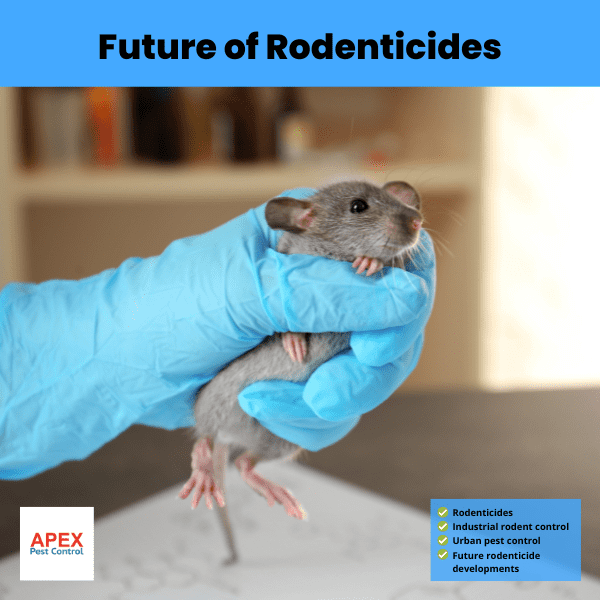
Research and Development
Continued research is critical to creating more effective and safer products. Newer generation ARs have been developed that are less toxic to non-target species while maintaining potency against rodents.
Potential Changes in Regulations
Regulations are continually evolving in response to new scientific evidence concerning their effects on human health and the environment. This may lead to further restrictions on certain chemicals or require additional precautions during usage.
Emerging Alternatives
As we seek to lessen reliance on pesticides, innovations in biological controls such as genetic modification or pheromone traps offer promising alternatives, although they still need to be fully evaluated in terms of efficacy and environmental impact.
Summary of Key Points
Recap of Rodenticides’ Definition, Uses, and Risks
Rodenticides serve an important role in controlling pest populations but come with inherent risks to both target and non-target species, humans, and the environment alike.
Recap of Safe Handling and Alternatives
Using these products safely and responsibly involves careful storage, appropriate application, and disposal. In addition, exploring alternative methods can help reduce dependence upon them, particularly in sensitive areas with high biodiversity or residential settings.
Recap of Regulations and Future Prospects
Regulatory oversight is key to managing the potential dangers posed by rodenticides. Ongoing changes based on the latest scientific findings look forward to continued advancements in the field through future research and development, aiming for better solutions in rodent control.
Frequently Asked Questions
Are rodenticides safe to use around children and pets?
While rodenticides are designed to be effective against rodents, they can pose risks to children, pets, and non-target wildlife if not used properly. Always use tamper-resistant bait stations and follow label instructions carefully. At Apex Pest Control, our professional pest control services provide safer application methods.
How long does it take for rodenticides to work?
The time frame varies depending on the type of rodenticide. Anticoagulants typically take 4-7 days to be lethal, while some non-anticoagulants like bromethalin can work within 24-48 hours. Factors such as the amount consumed and the rodent’s size can affect the timeline.
Can rodents become resistant to rodenticides?
Yes, resistance to some rodenticides, particularly first-generation anticoagulants, has been documented in many areas of the UK. This is why it’s important to use integrated pest management approaches and rotate between different types of rodenticides when necessary.
What should I do if a pet accidentally ingests rodenticide?
Immediately contact your veterinarian or a pet poison control hotline. Provide information about the specific rodenticide ingested if possible. Quick action is crucial, as treatments like vitamin K1 can be effective if administered promptly for anticoagulant poisoning.
Are there eco-friendly alternatives to chemical rodenticides?
Yes, there are several eco-friendly alternatives, including mechanical traps, electronic repellent devices, natural repellents, exclusion methods (sealing entry points), and biological control (encouraging natural predators). At Apex Pest Control, we can help you implement these methods as part of an integrated pest management approach.
Rodenticide Comparison Table
| Type | Active Ingredient | Speed of Action | Environmental Persistence | Secondary Poisoning Risk |
|---|---|---|---|---|
| FGAR | Warfarin | Slow (5-7 days) | Low | Low |
| SGAR | Brodifacoum | Moderate (3-5 days) | High | High |
| NAR | Bromethalin | Fast (1-2 days) | Low | Low |
| NAR | Cholecalciferol | Moderate (3-4 days) | Low | Low |
“While rodenticides remain an important tool in pest management, their use must be balanced with environmental and safety considerations. At Apex Pest Control, we advocate for an integrated approach that combines chemical control with alternative methods to achieve effective and responsible rodent management.”
– Tony Johnson, Lead Technician at Apex Pest Control
Statistics
- According to a recent study by the Rodenticide Resistance Action Committee, up to 70% of rats in some areas of the UK show resistance to first-generation anticoagulant rodenticides.
- The UK rodenticide market was valued at approximately £50 million in 2024, with a projected annual growth rate of 3.5% over the next five years.
- In South Yorkshire, professional pest control services report that rodent infestations account for about 40% of their callouts, highlighting the ongoing need for effective rodent control measures.
At Apex Pest Control, we’re committed to providing effective, safe, and responsible pest management solutions for residents and businesses in Sheffield, Barnsley, Rotherham, and across South Yorkshire. Our expert team stays up-to-date with the latest developments in rodenticide technology and integrated pest management strategies to ensure the best outcomes for our clients and the environment.

Tony Johnson, Founder & Lead Technician at Apex Pest Control, is a BPCA and NPTA accredited pest management expert with over 35 years’ hands-on experience. Tony specialises in Integrated Pest Management and ensures all services comply with UK pest legislation, including the Wildlife and Countryside Act 1981 and COSHH Regulations 2002. His commitment to continual learning and adapting to industry best practices means clients receive effective, safe solutions for pests affecting homes and businesses across South Yorkshire. Tony’s dedication to professional standards, ethical treatment methods, and local expertise has made him a trusted partner for pest control and prevention.
-
BPCA & NPTA accredited | CHAS certified
-
Committed to UK pest law compliance & safety
-
Focused on effective, ethical pest management for South Yorkshire

